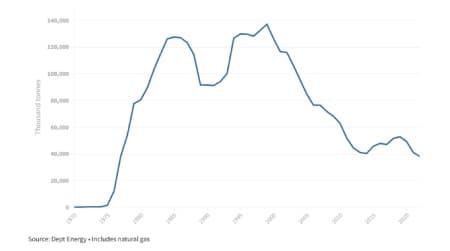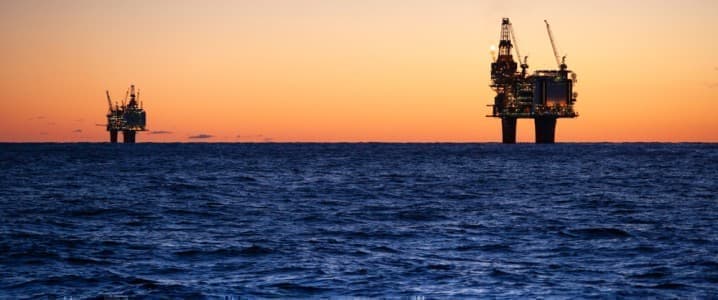The United Kingdom’s North Sea Transition Authority gave the greenlight in September for the development of the Rosebank field by owners Equinor ASA (NYSE:EQNR) and Ithaca Energy, with Prime Minister Riki Sunak’s government arguing that projects such as these are necessary to bolster domestic oil and gas production, lower costs for consumers, and provide “energy security” as the country transitions to low-carbon energy.
But the new North Sea licenses could be more trouble than they are worth, a fresh study has found.
An analysis by the Energy and Climate Intelligence Unit has revealed that new projects, such as Rosebank, will add less than 1% of the petrol used in the UK's cars within seven years but will come at a high reputational cost for a country that’s currently regarded as one of the continent’s green energy leaders.
“It doesn't help with security of supply, because oil and gas are part of international markets and 80 per cent of the oil is exported and processed overseas and who knows where it ends up as fuels,” Dr. Simon Cran-McGreehin, head of analysis at ECIU, has told The National.
Even if the UK hoarded everything it produced, it still wouldn’t meet the country’s energy needs, according to Cran-McGreehin.
“There's not enough of it any more; we currently use more oil than we produce in the North Sea so we'd have to import some anyway. It comes at the expense of the UK's reputation as, what we used to say, a climate leader,” he said.
The UK’s indigenous crude oil production in 2022 clocked in at ~320,000 barrels per day, enough for just 20% of the country’s consumption. To exacerbate matters, only 13% of that oil is refined in the country, a figure the ECIU has projected will fall to 1% by 2030 as North Sea production continues to decline.
UK indigenous production of crude oil
Indigenous production is any kind of extraction of energy products from natural sources

Source: NUK
Europe’s Quest For Energy Security
You cannot blame Sunak’s government too much for ignoring warnings by scientists and the United Nations that developing new fossil fuel resources will make it much harder for the planet to avoid catastrophic climate change. After all, a growing number of European nations have lately softened their hardline stance on fossil fuels ever since Russia’s war in Ukraine triggered an existential energy crisis in the continent.
Last year, the UK pushed back the ban on gasoline- and diesel-powered vehicles to 2035 and has proposed easing water quality rules for developers.
In September 2023, Britain formally lifted a 2019 moratorium on shale gas fracking, saying that energy security remains the government’s #1 priority. The lifting of the fracking ban marked a sharp turnaround after the government ended its support for fracking just three years prior because, “it is not possible with current technology to accurately predict the probability of tremors associated with fracking.”
And, it’s not like the country’s green energy sector is not facing major challenges.
The UK received zero bids for its September 2023 5GW offshore wind auction, with the government blamed for ignoring warnings that the offers on the table were too low to reflect soaring costs. This came as a fresh blow to Rishi Sunak’s objective to lower energy bills while also meeting climate targets. It also makes it harder for the government to achieve its target to install 50 GW of offshore wind capacity by 2030.
The government set a maximum price of £44 a MW hour for the latest auction in tandem with the price of the UK's offshore wind power which has fallen steeply in recent decades. Still, developers deemed it too low thanks to soaring construction costs, high inflation and rising borrowing costs.
“It’s an energy disaster and a £1bn Tory bombshell that will push bills up for hardworking families. The Conservatives have now trashed the industry that was meant to be the crown jewels of the British energy system … they broke the onshore wind market by banning it, they undermined the solar industry, and they caused chaos in the home insulation market,’’ Ed Miliband, the shadow climate change secretary, lamented.
Perhaps in an even more extreme move, Europe’s nuclear energy sector has recorded a palpable shift in support by governments and the general public. In one monumental case, last year, Finland's Green Party voted overwhelmingly to categorize nuclear power as a form of sustainable energy, ending decades of strong opposition.
“I am very happy and proud. This is a historical moment in the history of the green movement, as we are the first green party in the world to officially let go of anti-nuclearism.” said Tea Törmänen, a voting member and chair of the Savonia/Karelia chapter of Viite, the pro-science internal group of the party, shortly after the vote.
Meanwhile, German and Japanese citizens have become more receptive to nuclear power. Nuclear energy is increasingly seen as a cleaner and viable alternative to coal: nuclear plants produce 117 grams of CO2 emissions per kilowatt-hour compared to over 1,000 grams of CO2 per kilowatt-hour produced by coal-powered plants.
By Alex Kimani for Oilprice.com
More Top Reads From Oilprice.com:
- U.S., UK Shoot Down 21 Drones in Red Sea
- India Boosts Saudi Crude Oil Imports Following Price Cuts
- American Gasoline Finds New Market in Australia



















Even a small production helps reduce UK’s oil imports, adds to energy security and also reduces budget deficit.
Calls like these might be motivated by the environmental lobby but energy security and the needs of the economy should always take precedence over climate change goals.
Dr Mamdouh G Salameh
International Oil Economist
Global energy Expert